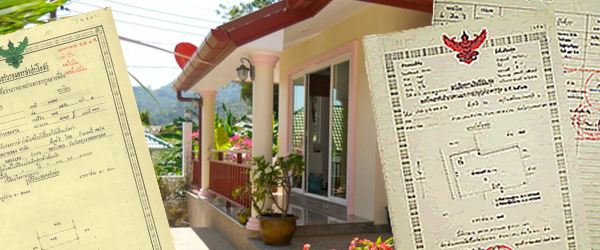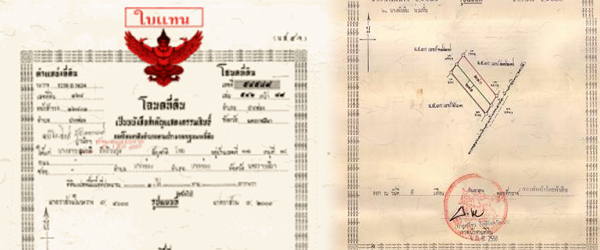Foreign investors buying property in Phuket or other province in Thailand should be very careful when dealing with Thai Title Deeds. The title-deed system in Thailand is not the same as in the home country of the investor so it is best that a real estate lawyer is consulted prior to getting into any transaction. The Thai government created certain types of title deeds for the rural poor so it is likely to encounter some of such title deeds in your transactions.
A title deed on a land or property shows a person’s rights to land (ownership in case of a chanote title deed) and registered encumbrances such as mortgages, leases, etc. Foreign nationals are not allowed to own even a parcel of land and therefore have no right to be named owner of land in Thailand. However, they can be registered as the holder of certain rights like lease, habitation, mortgage, usufruct or superficies, etc.
There are 4 different types of title deed in Thailand used as common evidence of land ownership, possession rights and other interests on the land and it is essential to understand correctly what each title deed covers or means.
Chanote (Title Deed)
This is a certificate for land ownership. A person with their name shown on the title deed has the legal right to the land, and can use it as evidence to confirm the right to government authorities. This title deed shows the official government land survey points setting the legal boundaries of the land. This is the most secure type of land title and Thailand’s Land Department is aiming at covering all land in the country under this title deed.
Nor Sor 3 Kor (Confirmed Certificate of Use)
This is a certificate confirming that the person’s name appearing on the certificate has the confirmed right to use the land implying that all requirements needed for the title deed issuance have been complied with and that it is pending with the Land Department. Land with a Nor Sor 3 Kor title deed may be sold, leased, used as a mortgage collateral, etc. and the holder of this certificate cannot leave the land unattended for more than 12 years.
Nor Sor Sam (Certificate of Use)
This differs from Nor Sor 3 Kor in terms of not complying or performing the formalities to certify the right to use. A notice of intent must be posted before a transfer can be made and 30 days public notice is required before any change of status over the land can be registered.
Sor Kor Nung (Certificate of Possession)
This certificate recognizes that the person is in possession of land but it does not imply that there are any rights associated with the possession. It is not transferrable but a person in possession may transfer the physical possession to another person and that person should apply for a new Certificate of Possession. This is not recommended for foreign investors as they will have no rights to the land or property even if they paid for the certificate.
It is a safe practice to always ask the lawyer to check the front and back end of the property title deed in order to see who the current owner is; the shape, area and orientation of the property; border to a public property such as a road, ocean or stream; and if the property has endorsements or liens. A title deed should be clean of any previous obligations or encumbrances. Otherwise the transaction should not push through.
To be safe, it is always advised to seek professional help for plans of acquiring a piece of parcel or for plans of having rights in a piece of land. A monetary investment in this type of asset is quite a venture and there are rules established by the respective government of a chosen country. Adhering to the by-laws is another issue that should not be neglected. Seeking help from knowledgeable professionals will make the transition of title deeds a lot easier.







